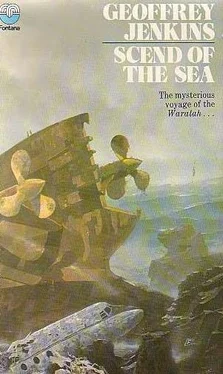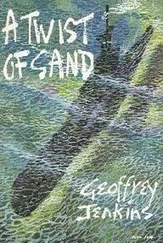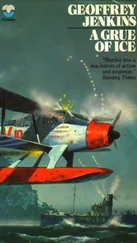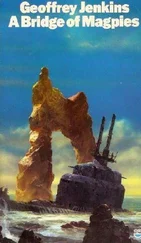Geoffrey Jenkins - Scend of the Sea
Здесь есть возможность читать онлайн «Geoffrey Jenkins - Scend of the Sea» весь текст электронной книги совершенно бесплатно (целиком полную версию без сокращений). В некоторых случаях можно слушать аудио, скачать через торрент в формате fb2 и присутствует краткое содержание. Жанр: Морские приключения, на английском языке. Описание произведения, (предисловие) а так же отзывы посетителей доступны на портале библиотеки ЛибКат.
- Название:Scend of the Sea
- Автор:
- Жанр:
- Год:неизвестен
- ISBN:нет данных
- Рейтинг книги:5 / 5. Голосов: 1
-
Избранное:Добавить в избранное
- Отзывы:
-
Ваша оценка:
- 100
- 1
- 2
- 3
- 4
- 5
Scend of the Sea: краткое содержание, описание и аннотация
Предлагаем к чтению аннотацию, описание, краткое содержание или предисловие (зависит от того, что написал сам автор книги «Scend of the Sea»). Если вы не нашли необходимую информацию о книге — напишите в комментариях, мы постараемся отыскать её.
Scend of the Sea — читать онлайн бесплатно полную книгу (весь текст) целиком
Ниже представлен текст книги, разбитый по страницам. Система сохранения места последней прочитанной страницы, позволяет с удобством читать онлайн бесплатно книгу «Scend of the Sea», без необходимости каждый раз заново искать на чём Вы остановились. Поставьте закладку, и сможете в любой момент перейти на страницу, на которой закончили чтение.
Интервал:
Закладка:
Shortly after Waratah had passed Clan Macintyre, Captain Ilbery returned to the bridge. He was formal, which showed he had reached a decision in a difficult situation. There are not many captains who would have the courage to risk censure by running from a storm which had not yet developed into anything special in a crack, well-engined 10,000-tonner.
'I am going to do what my sailing-ship instincts tell me,' he informed me. 'Haul out, Mr Fairlie.'
I set course as he directed, and Waratah headed seawards across Clan Macintyre's bows and across the scend of the sea — its run was now strongly from the south-west — while the wind rose to a full gale. The new course, taking the sea on her starboard bow, brought several heavy seas aboard, and drenched the coaling gangs I had set to work.
Shortly after 10 o'clock-it seems scarcely credible that it happened a brief twelve hours ago — Waratah was struck by a heavy beam sea. She hung at the end of her roll in her characteristic way until I was convinced she would never come back. She lay in that position for perhaps five or six seconds, and then yawed off course landwards. Her recovery from the roll had been so sluggish that I feared that the worst had happened below.
Within seconds, I had an emergency call from the chief engineer. Hundreds of tons of coal had shifted in that awful roll and were lying against the ship's steering rods, jamming the rudder. I sent to Captain Ilbery to come to the bridge while I ran to the engine-room. That is the reason why I am alive tonight. With the rudder jammed, the ship's head swung round, away from the safety Captain Ilbery had so wisely sought. The ship listed badly to starboard. It was now blowing a full gale from the south-west. The sea had worked up with alarming rapidity. The speed was still on her when I rushed from the bridge to the engine-room.
It is hard to write of a man one has seen burned to death before one's very eyes. Vinney, the engineer, was waiting for me. The engine-room was a holocaust. Vast quantities of coal were lying across the steering rods and this would have to be cleared before the ship could be brought under control. Already two coal trimmers were not accounted for. The roar of steam being blown off drowned the senses. Vinney had also emptied the main furnace ash chute as a precaution.
It is impossible for me now to estimate times, or say how long I had been in the engine-room, but the engineer and I were on the catwalk by No. 2 boiler furnace making hurried plans to clear the coal when the disaster happened. I am still too dazed to give a coherent account of it, but do this I must, for this is my final task.
One moment Vinney was beside me; the next, the entire furnace seemed to tip forward as the ship's bows dropped at an angle so unlikely that it seemed to deny she was a craft on the surface of the sea. White-hot coal spewed from the furnace over the engineer and two stokers. I did not even hear them scream, it was so sudden. In a moment, it seemed, the whole engine-room — furnaces, engines, bunkers, boilers — turned upside down. At the same instant there was a tremendous crash and a rending noise whose like I have never heard before. Even now, nearly twelve hours afterwards, I have difficulty in crediting that this 10,000-ton ship capsized, turned completely turtle.
I found myself hanging on to the catwalk railing staring upwards through the metal tunnel of the ash chute which had been emptied. Had the engineer not dumped its contents at the first emergency, a cascade of white-hot ash would have written the same fate for me as for him. Scalding steam and smoke made it impossible to see across the inferno of the engine-room; the roar of escaping steam boomed and reverberated between the metal walls of the compartment like non-stop thunder.
As I groped to haul myself on to the inverted catwalk, I was confronted with another impossibility — I was looking at driving storm clouds across the sky through the chute opening! The cable to the ash chute hatch had been left unsecured in the haste to empty its contents and the watertight bulkhead intersecting the tunnel about fifteen feet from the bottom had swung wide of its own accord.
My movements were instinctive. My sole thought was to escape from the roaring, thundering, scaring engine-room before the boilers exploded. Everything was lit by the red glow of the flaming coal which had been ejected from the furnaces, and I coughed and gasped for breath in the swirling smoke. I had no conscious appreciation in those desperate first minutes of the nature of the disaster which had overtaken the ship — all I knew was that she had capsized completely. In the baleful light I saw a trimmer's lamp attached to the catwalk rail. I took it and climbed up into the ash chute. I closed the bulkhead behind me so that when the boilers exploded, I would be shielded against the concussion.
At that stage I considered that the ship, after turning over, was floating upside down with her keel in the air. I think I first intended to swim clear of her, but when I put my head outside the open hatch for a moment, the sight of the boiling sea and insane wind drove me back, terrified. I tugged the hatch cover closed by means of the cable and lit the trimmer's lamp. Better to have at least a floating wreck under one than be cast adrift on that awe-inspiring sea. I tried to pull myself together.
The catastrophe overtook the ship at between 10 and 11 this morning, but it was not for fully an hour afterwards-, sitting here in the ash chute in a state of numbed shock, that I came to realize that my first reconstruction of it, namely, that the vessel was floating upside down, was wrong. Shortly after I entered the chute there was a violent, grinding movement like an earthquake which brought terror to my already overwrought nerves: I thought the ship was settling and that the boilers would explode when the sea reached them. This cataclysmic noise drowned even the racket and vibration of the screws turning in empty air above my head. The grinding and rending threw me from side to side in the chute. I was too terrified to try and open the hatch again. When the violence and movement stopped, I came to the conclusion that the ship must have been settling down on some solid object, crushing the superstructure as she did so, with that nightmare of noise.
The boilers did not explode, as I feared. I felt the screws start to slow, and then stop, as the steam pressure fell away.
I blessed Vinney's foresight for throwing open the steam safety valves.
I am not sure now whether the noise, or the silence which followed, were more terrifying. I found courage at last to try the hatch again. I thought it had jammed, but the significance of it did not come home to me until I cautiously screwed open the bulkhead door through which I had come from the engine-room. A jet of compressed air and stale smoke whistled in, but before hastily screwing it shut, I caught a glimpse below.
The ship was full of water!
In this moment of my extremity — the light is beginning to flicker for want of air and my breathing becomes more difficult as the tunnel's oxygen is spent-I know that I am sealed alive in a ship which, for some reason which I cannot explain, is neither afloat nor ashore.
Later: Breathing very difficult. No point in prolonging my life further. Ship rocked and heaved. No. 1 hatch burst, I think. I will douse the light now to have use of the last of air for what I must do, namely, open the lower bulkhead to the flooded engine-room, and go through. I will then seal the chute behind me with this account to tell how the Waratah met her end, so that the sea will not be able to reach it.
Under my grandfather's signature was scrawled, 'Read this. Will scratch message for Ian on panel cut from Gemsbok — Bruce Fairlie, captain, SAA Viscount Gemsbok, July 19, 1967.'
Читать дальшеИнтервал:
Закладка:
Похожие книги на «Scend of the Sea»
Представляем Вашему вниманию похожие книги на «Scend of the Sea» списком для выбора. Мы отобрали схожую по названию и смыслу литературу в надежде предоставить читателям больше вариантов отыскать новые, интересные, ещё непрочитанные произведения.
Обсуждение, отзывы о книге «Scend of the Sea» и просто собственные мнения читателей. Оставьте ваши комментарии, напишите, что Вы думаете о произведении, его смысле или главных героях. Укажите что конкретно понравилось, а что нет, и почему Вы так считаете.












